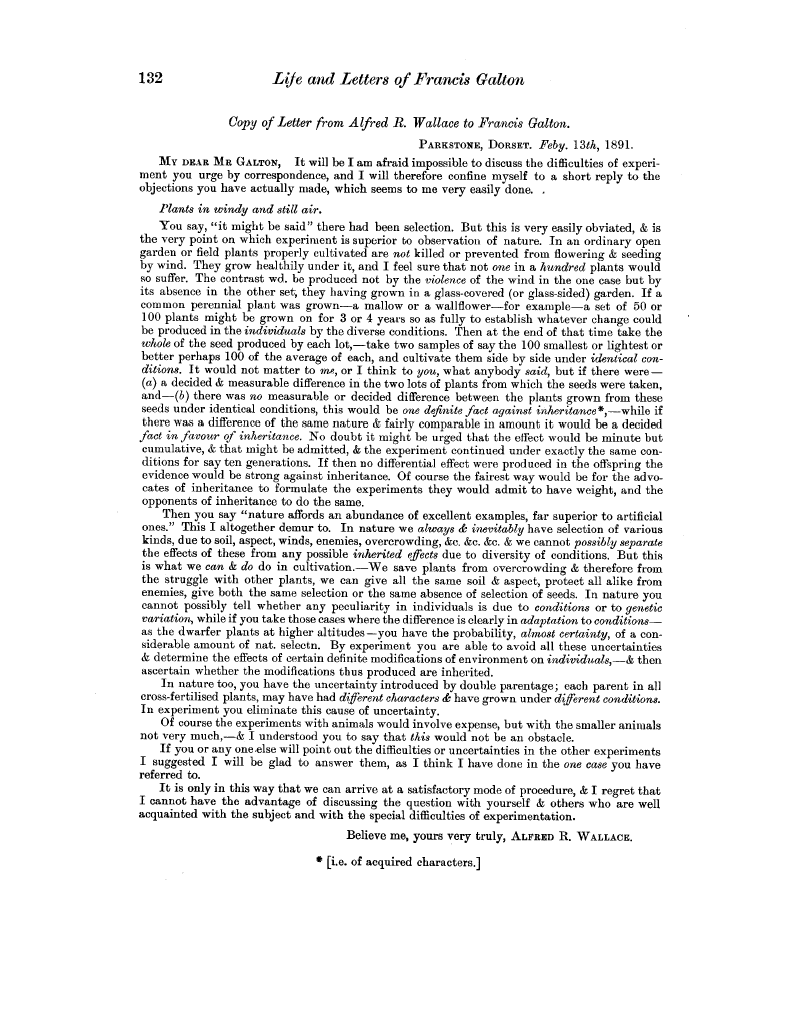| ||||||

OCR Rendition - approximate
132 Life and Letters of Francis Galton Copy of Letter from Alfred R. Wallace to Francis Galton. PARKSTONE, DORSET. Feby. 13th, 1891. MY DEAR MR GALTON, It will be I am afraid impossible to discuss the difficulties of experiment you urge by correspondence, and I will therefore confine myself to a short reply to the objections you have actually made, which seems to me very easily done. . Plants in windy and still air. You say, "it might be said" there had been selection. But this is very easily obviated, & is the very point on which experiment is superior to observation of nature. In an ordinary open garden or field plants properly cultivated are not killed or prevented from flowering & seeding by wind. They grow healthily under it, and I feel sure that not one in a hundred plants would so suffer. The contrast wd. be produced not by the violence of the wind in the one case but by its absence in the other set; they having grown in a glass-covered (or glass-sided) garden. If a common perennial plant was grown-a mallow or a wallflower-for example-a set of 50 or 100 plants might be grown on for 3 or 4 years so as fully to establish whatever change could be produced in the individuals by the diverse conditions. Then at the end of that time take the whole of the seed produced by each lot,-take two samples of say the 100 smallest or lightest or better perhaps 100 of the average of each, and cultivate them side by side under identical conditions. It would not matter to me, or I think to you, what anybody said, but if there were(a) a decided & measurable difference in the two lots of plants from which the seeds were taken, and-(b) there was no measurable or decided difference between the plants grown from these seeds under identical conditions, this would be one definite fact against inheritance *,-while if there was a difference of the same nature & fairly comparable in amount it would be a decided fact in favour of inheritance. No doubt it might be urged that the effect would be minute but cumulative, & that might be admitted, & the experiment continued under exactly the same conditions for say ten generations. If then no differential effect were produced in the offspring the evidence would be strong against inheritance. Of course the fairest way would be for the advocates of inheritance to formulate the experiments they would admit to have weight, and the opponents of inheritance to do the same. Then you say "nature affords an abundance of excellent examples, far superior to artificial ones." This I altogether demur to. In nature we always & inevitably have selection of various kinds, due to soil, aspect, winds, enemies, overcrowding, &c. &c. &c. & we cannot possibly separate the effects of these from any possible inherited effects due to diversity of conditions. But this is what we can & do do in cultivation.-We save plants from overcrowding & therefore from the struggle with other plants, we can give all the same soil & aspect, protect all alike from enemies, give both the same selection or the same absence of selection of seeds. In nature you cannot possibly tell whether any peculiarity in individuals is due to conditions or to genetic variation, while if you take those cases where the difference is clearly in adaptation to conditionsas the dwarfer plants at higher altitudes-you have the probability, almost certainty, of a considerable amount of nat. selectn. By experiment you are able to avoid all these uncertainties & determine the effects of certain definite modifications of environment on individuals,-& then ascertain whether the modifications thus produced are inherited. In nature too, you have the uncertainty introduced by double parentage; each parent in all cross-fertilised plants, may have had diferent characters & have grown under diferent conditions. In experiment you eliminate this cause of uncertainty. Of course the experiments with animals would involve expense, but with the smaller animals not very much,-& I understood you to say that this would not be an obstacle. If you or any onee else will point out the difficulties or uncertainties in the other experiments I suggested I will be glad to answer them, as I think I have done in the one case you have referred to. It is only in this way that we can arrive at a satisfactory mode of procedure, & I regret that I cannot have the advantage of discussing the question with yourself & others who are well acquainted with the subject and with the special difficulties of experimentation. Believe me, yours very truly, ALFRED R. WALLACE. # [i.e. of acquired characters.]
|